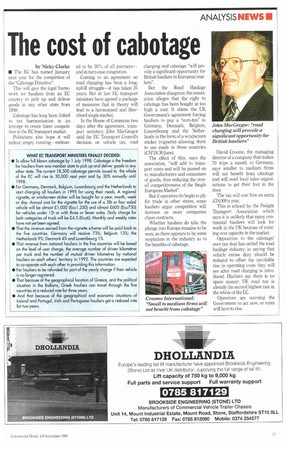The cost of cabotage
Page 21

If you've noticed an error in this article please click here to report it so we can fix it.
by Nicky Clarke • The EC has named January next year for the completion of the “Cabotage Directive".
This will give the legal framework tor hauliers from an EC country to pick up and deliver goods in any other state from 1998.
Cabotage has long been linked to tax harmonisation in an attempt to create fairer competition in the EC transport market.
Politicians also hope it will reduce empty running—estimat ed to be 30% of all journeys— and in turn ease congestion.
Coming to an agreement on road charging has been a long, uphill struggle—it has taken 25 years. But at last EC transport ministers have agreed a package of measures that in theory will lead to a harmonised and liberalised single market.
In the House of Commons two days after the agreement, transport secretary John MacGregor said the EC Transport Council's decision on vehicle tax, road charging and cabotage "will provide a significant opportunity for British hauliers in European markets".
But the Road Haulage Association disagrees: the association alleges that the right to cabotage has been bought at too high a cost. It slams the UK Government's agreement forcing hauliers to pay a "euro-tax" to Germany, Denmark, Belgium, Luxembourg and the Netherlands in the form of a windscreen sticker (vignette) allowing them to use roads in those countries (CM 24-30 June).
The effect of this, says the association, "will add to transport costs and will be passed on to manufacturers and consumers of goods, thus reducing the overall competitiveness of the Single European Market".
But if operators do begin to ply for trade in other states, some hauliers argue competition will increase as more companies chase contracts.
Whether hauliers do take the plunge into Europe remains to be seen, as there appears to be some scepticism in the industry as to the benefits of cabotage. David Croome, the managing director of a company that makes 70 trips a month to Germany says smaller to medium firms will not benefit from cabotage and will need local sales organisations to get their foot in the door.
The tax will cost him an extra £24,000 a year.
This is echoed by the Freight Transport Association which says it is unlikely that many continental hauliers will look for work in the UK because of existing over capacity in the market.
Opposition to the cabotage/ euro tax deal has united the road haulage industry in saying that vehicle excise duty should be reduced to offset the inevitable rise in operating costs they will see after road charging is introduced. Hauliers say there is no spare money: UK road tax is already the second highest rate in the whole of the EC.
Operators are warning the Government to act now, or rates will have to rise.












































































































